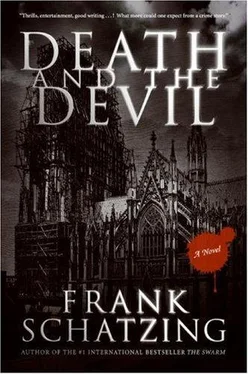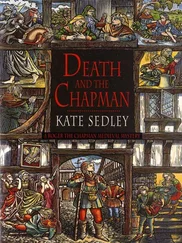Kuno rubbed his eyes and forced his mind back to the question of the warehouse.
Why did nobody take him seriously? All his life he had never been more than an appendage. He lacked the determination of his brothers, who had become involved in political life from an early age, the business sense of his father, everything. Yet he was the only one left in Cologne.
The loneliest of all.
The warehouse! The warehouse!
He knew all the Overstolz warehouses. Most of them, anyway. Almost all were old, depending on how you defined old, of course. What did Daniel mean? Mean by “old,” that is?
Daniel was a rebel, a self-centered rebel without a cause. A late follower of the Goliards, with their love of wine, women, and song, but without their poverty, despising tradition simply because it was tradition. What would “old” mean to someone like that?
Old in the sense of a ruin?
Too old.
Old and abandoned!
Kuno clicked his fingers. That was it. It was an abandoned warehouse Daniel had been talking about, one that was no longer in use.
He couldn’t ask questions about it, but that probably wasn’t necessary. He knew of several old, abandoned warehouses belonging to the Overstolzes. They were all by the Wall, opposite the river island of Rheinau. Mournful, tumbledown sheds that were not even let out because the Overstolzes would rather allow them to decay than pay tax on the rent.
A good idea to have a look around there.
Kuno smiled. At last there was something meaningful he could do.
The impressive, if gloomy, shape of St. Pantaleon rose up before them as, leaning into the wind, they turned into Walengasse. The rain had gotten inside Jacob’s hood and was running down his neck. During the last hour it had become bitterly cold. He was looking forward to getting into the monastery as he would have looked forward to any dry place.
They had left the lepers’ outfits behind; they might do more harm than good now. If Jaspar was right and they were no longer being pursued, there was no point in disguise. Jacob insisted on covering his hair, so was still wearing Jaspar’s old habit. He had tucked his hands up the sleeves, which would have made him look as if he were wrapped in devout contemplation were it not for the unchristian pace they were hurrying along at. Jaspar, on the other hand, was striding along, fists pumping the air like a peasant. His hood had slipped down, leaving the rain to beat a tattoo on his bald pate, and with every step he seemed to be trying to stamp his way through the soft mud to hell.
They met no one. God knows, it was no fun being out in the city in the pouring rain.
On their way they had briefly looked in at the house on the Brook. Goddert wasn’t there. At first they had been worried, but there was no indication that anything had happened to him. If the murderer already had Richmodis, what was the point of taking Goddert, too?
So they had continued on their way to Walengasse, while Jaspar explained to Jacob what he hoped to learn there.
“You remember I mentioned a cripple who told me about the tiny crossbows? The man with no legs. St. Pantaleon has a large hospice and he’s been living there for several years. I’ve seen him two or three times without speaking to him. I’ve no idea if we’ll get any sense out of him; even when I talked to him before he wasn’t quite right in the head. If my theory’s correct and our murderer was a crusader, then they’ll have fought in the same battles. An educated man with hair down to his waist will have stood out among the dregs of humanity their armies were mostly made up of.”
“What? Among thousands of men?”
“The armies were always commanded by a small group of kings, counts, and bishops. I’m assuming he was one of them.”
“A bold assumption.”
“I know it sounds harebrained, but it’s worth a try all the same.”
“Anything’s better than sitting around doing nothing,” Jacob agreed. By now they had reached St. Pantaleon. Above the door in the solid wall an oil lamp was swinging in the wind, knocking against the stone at irregular intervals.
Shoulders hunched, they squeezed in under the narrow projecting roof and knocked. It wasn’t long before a tiny window was pushed up. Watery eyes twitched uneasily to and fro under bushy brows.
“It’s after vespers,” an old man’s voice croaked.
“True, reverend Brother,” said Jaspar. “I would not have been so bold as to ask for admittance at this late hour, if I and Brother Jacob here were not engaged on a mission of Christian charity to thwart a devilish attempt to ensnare innocent people body and soul.”
“And who are you?”
“Jaspar Rodenkirchen, dean of St. Mary Magdalene’s. Also physician and Master of Arts.”
The fluttering of the pupils became even more hectic. “I must ask the abbot.”
“We quite understand,” Jaspar assured him, “and respect the prudence of venerable old age. The only thing we would ask is that you do so as quickly as you can since it has pleased the Lord to make the heavens shed tears at the sins of the ungodly.”
“Wait here.” The flap slid down.
“Senile bloody half-wit,” growled Jaspar. “I know Saint Benedict, talking about monks, said, ‘Become a fool for Christ’s sake,’ but he didn’t mean they should ignore the gift of reason.” In fury he strode up and down along the wall. “‘I must ask the abbot, I must ask the abbot.’ And who’s the abbot to ask? Does God have to decide every time whether a door is to be opened or closed? Will these monks never learn to think?”
It was quite some time before the door creaked open and they hurried inside.
A monk who was indeed very old and bent indicated the tall man at his side who was regarding them with a benevolent gaze. He and Jaspar grasped each other by the shoulders and exchanged a brief kiss.
“What can I do for you at this late hour, Brother Jaspar?” the abbot asked.
“A small matter. It is very important I speak to someone in the hospice.” Jaspar smiled. “If it is no trouble, of course.”
Clasping his arms behind his back, the abbot assumed a lofty expression. He looked as if he were giving the matter earnest consideration. “You’re late,” he said skeptically.
“I know.”
“Did you not say something to Brother Laurence here about the machinations of the Devil? As you will know, the monks in this monastery fear the Devil at all times, but experience tells us that he is at his most dangerous after dark. That is why we have to subject guests who arrive this late to particular scrutiny. You must not interpret our cautiousness as suspicion, but—”
“Not in the least,” Jaspar broke in. “To be precise, the Devil I was talking about is the fiend that comes from the past to torment our innermost souls. Old wounds reopen. But often it is the old wounds that lead us to new weapons, if you get my meaning?”
The abbot clearly did not, but he nodded affably.
“Furthermore,” Jaspar went on, “this fiend manifests itself in madness and speaks out of the mouths of those whose spirits are confused. I do not mean to suggest you are housing this fiend here. The balm of your care, I have heard, soothes the sufferings of those poor souls whose minds rave in a confusion of tongues.”
“We have established a special section for that kind of case,” said the abbot, not without pride.
“Yes, it is praised far and wide. Your reputation for compassion is only exceeded by the fame of your learning. Or was it the other way around? I know that the brothers here have astonishing expertise in that area. But to get to the nub of my request, there is in that section a poor soul whose name, I believe, is Hieronymus and who may be able to help us track down this foul fiend.”
Читать дальше












